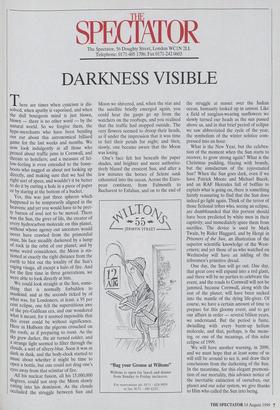SPECTAT THE OR
The Spectator, 56 Doughty Street, London WC1N 2LL Telephone: 0171-405 1706; Fax 0171-242 0603
DARKNESS VISIBLE
Yes, this was just three spheres which happened to be temporarily aligned in the heavens; and yet you would have to be pret- ty barren of soul not to be moved. There was the Sun, the giver of life, the creator of every hydrocarbon molecule on this planet, without whose agency our ancestors would never have crawled from the primordial ooze, his face steadily darkened by a lump of rock in the orbit of our planet; and by some weird coincidence, the Moon is sta- tioned at exactly the right distance from the earth to blot out the totality of the Sun's raging visage, all except a halo of fire. And for the first time in three generations, we were able to look directly at him. We could look straight at the Sun, some- thing that is normally forbidden to mankind, and as the seconds ticked by of what was, for Londoners, at least, a 95 per cent eclipse, one felt the superstitious awe of the pre-Galilean era, and one wondered what it meant, for it seemed impossible that this event could be without significance. Here in Holborn the pigeons crouched on the roofs, as if preparing to roost. As the sky grew darker, the air turned colder, and a strange light seemed to filter through the clouds, a sort of silvery-blue. Soon it was as dark as dusk, and the body-clock started to muse about whether it might be time to open a bottle, but one could not drag one's eyes away from that scimitar of fire. All his nuclear fusion, all his 15,000,000 degrees, could not stop the Moon slowly eating into his dominion. As the clouds occluded the struggle between Sun and Moon we shivered, and, when the star and the satellite briefly emerged again, you could hear the gasps go up from the watchers on the rooftops, and you realised that the traffic had stopped outside. The very flowers seemed to droop their heads, as if under the impression that it was time to furl their petals for night; and then, slowly, one became aware that the Moon was losing.
One's face felt hot beneath the paper shades, and brighter and more authorita- tively blazed the crescent Sun, and after a few minutes the horses of Selene sank exhausted into the ocean. Across the Euro- pean continent, from Falmouth to Bucharest to Esfahan, and on to the end of the struggle at sunset over the Indian ocean, humanity looked up in unison. Like a field of sunglass-wearing sunflowers we slowly turned our heads as the sun passed above us, and in that brief period of eclipse we saw abbreviated the cycle of the year, the symbolism of the winter solstice com- pressed into an hour.
What is the New Year, but the celebra- tion of the moment when the Sun starts to recover, to grow strong again? What is the Christmas pudding, blazing with brandy, but the simulacrum of the rejuvenated Sun? When the Sun goes dark, even if we have Patrick Moore and Michael Buerk, and an RAF Hercules full of boffins to explain what is going on, there is something faintly reassuring to find that the Sun does indeed go light again. Think of the terror of those fictional tribes who, seeing an eclipse, are dumbfounded that this portent should have been predicted by white men in their captivity; and immediately spare them from sacrifice. The device is used by Mark Twain, by Rider Haggard, and by Herge in Prisoners of the Sun, an illustration of the superior scientific knowledge of the West- erners; and yet those of us who watched on Wednesday will have an inkling of the tribesmen's primitive dread.
One day, the Sun will go out. One day, that great core will expand into a red giant, and there will be no parties to celebrate the event, and the roads to Cornwall will not be jammed, because Cornwall, along with the rest of the planet, will have been sucked into the mantle of the dying life-giver. Of course, we have a certain amount of time to prepare for this gloomy event, and to get our affairs in order — several billion years, we understand. But the period is finite, dwindling with every burnt-up helium molecule, and that, perhaps, is the mean- ing, or one of the meanings, of this solar eclipse of 1999.
We will have another warning, in 2090, and we must hope that at least some of us will still be around to see it, and draw their conclusions from the darkening of the Sun. In the meantime, for this elegant premoni- tion of our mortality, this advance notice of the inevitable extinction of ourselves, our planet and our solar system, we give thanks to Him who called the Sun into being.


























































 Previous page
Previous page